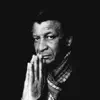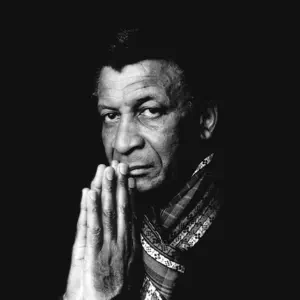


CIUDAD NATAL
Cape Town, South Africa
NACIMIENTO
9 de octubre de 1934
Acerca de Abdullah Ibrahim
South African pianist Abdullah Ibrahim's effervescent sound is immediately recognizable. It is steeped in the folk traditions of his homeland, from township folk and A.M.E. gospel to Indian raga, yet is wed to the elegant compositional flair of Duke Ellington, canny notions of harmony and rhythm learned from Thelonious Monk, and classical technical proficiency. Beginning his career with Cape Town's the Jazz Epistles in 1960, Ibrahim has continually explored new ground while affirming jazz tradition in his imaginative playing and writing. After moving to Europe in 1962, he made his mark with 1963's Duke Ellington Presents the Dollar Brand Trio. Two years later, while living in New York City as an exile, his debut solo piano set Reflections established his reputation globally. His star and influence continued to rise during the '70s thanks to a slew of recordings, including 1973's African Space Program and 1979's African Marketplace. Ibrahim returned to his homeland permanently in 1990 at Nelson Mandela's personal invitation, and performed at the leader's inauguration in 1994. In the 21st century, he has traveled between Cape Town, New York, and Japan, playing concert halls and festivals, issuing solo and ensemble recordings including African Magic in 2000, Bombella with the WDR Big Band in 2008, and The Balance with Ekaya in 2019. Ibrahim has also composed the scores for director Claire Denis' films Chocolat and No Fear No Die.
Exposed to a variety of music as a youngster, including traditional African music, religious songs, and jazz, Ibrahim began studying piano at the age of seven. Becoming a professional musician in 1949, he performed with such South African groups as the Tuxedo Slickers and the Willie Max Big Band. Ten years later, he joined the Jazz Epistles, a group featuring trumpet player Hugh Masekela and alto saxophonist Kippi Moeketsi. The band, which had been formed in 1959 by American pianist John Mehegan for a recording session, Jazz in Africa, had recorded the first jazz album by South African musicians.
In 1962, Ibrahim left South Africa with vocalist Sathima Bea Benjamin; the two were married in 1965, and temporarily settled in Zurich. Performing with his trio, which featured bassist Johnny Gertze and drummer Makaya Ntshoko, Duke Ellington heard Ibrahim at The Africana Club. Ellington was so impressed that he arranged a recording session for Ibrahim and the trio. The resulting album, Duke Ellington Presents the Dollar Brand Trio, was released on the Reprise label in 1963. He continued to be supported by Ellington following the album's release. In addition to being booked to play (at Ellington's urging) at the Newport Jazz Festival in 1965, Ibrahim served as Ellington's substitute and performed five shows with the Ellington Orchestra the following year. Shortly afterwards, he disbanded the trio and accepted an invitation to join Elvin Jones' quartet. The collaboration with Jones lasted six months. After leaving the Jones quartet, he continued to be involved with a variety of projects. Besides touring as a soloist in 1968, he worked with bands led by Don Cherry and Gato Barbieri. Briefly returning to South Africa in 1976, Ibrahim settled in New York the same year. Although he returned to South Africa to live in 1990, he continued to divide his time between his birthplace and his adopted home in New York.
In 1997, Ibrahim collaborated on an album and tour with jazz drummer Max Roach. The following year, Swiss composer Daniel Schnyder arranged several of his compositions for a 22-piece orchestra for a Swiss television production, and for a world tour undertaken by the full-sized Munich Radio Philharmonic Orchestra conducted by Barbara Yahr of the United States. Ibrahim continued to perform and record for the remainder of the '90s and throughout the 2000s, releasing such notable albums as African Suite (1999, Enja), Cape Town Revisited (2000, Enja; recorded in 1997), African Magic (2003, Enja/Justin Time), Senzo (2008, Sunnyside), and Bombella (2009, Intuition). In 2010, Ibrahim and Ekaya released Sotho Blue and toured the festival circuit behind it. 2013's Mukashi: Once Upon a Time was written and recorded as tribute to his teacher in Zen philosophy. After issuing The Song Is My Story, a solo piano and saxophone offering in 2014, he devoted his time to working on various projects in Cape Town and touring Europe and Asia. In the summer of 2019, accompanied by an all-new nonet version of Ekaya, he released The Balance for Gearbox. ~ Craig Harris
Exposed to a variety of music as a youngster, including traditional African music, religious songs, and jazz, Ibrahim began studying piano at the age of seven. Becoming a professional musician in 1949, he performed with such South African groups as the Tuxedo Slickers and the Willie Max Big Band. Ten years later, he joined the Jazz Epistles, a group featuring trumpet player Hugh Masekela and alto saxophonist Kippi Moeketsi. The band, which had been formed in 1959 by American pianist John Mehegan for a recording session, Jazz in Africa, had recorded the first jazz album by South African musicians.
In 1962, Ibrahim left South Africa with vocalist Sathima Bea Benjamin; the two were married in 1965, and temporarily settled in Zurich. Performing with his trio, which featured bassist Johnny Gertze and drummer Makaya Ntshoko, Duke Ellington heard Ibrahim at The Africana Club. Ellington was so impressed that he arranged a recording session for Ibrahim and the trio. The resulting album, Duke Ellington Presents the Dollar Brand Trio, was released on the Reprise label in 1963. He continued to be supported by Ellington following the album's release. In addition to being booked to play (at Ellington's urging) at the Newport Jazz Festival in 1965, Ibrahim served as Ellington's substitute and performed five shows with the Ellington Orchestra the following year. Shortly afterwards, he disbanded the trio and accepted an invitation to join Elvin Jones' quartet. The collaboration with Jones lasted six months. After leaving the Jones quartet, he continued to be involved with a variety of projects. Besides touring as a soloist in 1968, he worked with bands led by Don Cherry and Gato Barbieri. Briefly returning to South Africa in 1976, Ibrahim settled in New York the same year. Although he returned to South Africa to live in 1990, he continued to divide his time between his birthplace and his adopted home in New York.
In 1997, Ibrahim collaborated on an album and tour with jazz drummer Max Roach. The following year, Swiss composer Daniel Schnyder arranged several of his compositions for a 22-piece orchestra for a Swiss television production, and for a world tour undertaken by the full-sized Munich Radio Philharmonic Orchestra conducted by Barbara Yahr of the United States. Ibrahim continued to perform and record for the remainder of the '90s and throughout the 2000s, releasing such notable albums as African Suite (1999, Enja), Cape Town Revisited (2000, Enja; recorded in 1997), African Magic (2003, Enja/Justin Time), Senzo (2008, Sunnyside), and Bombella (2009, Intuition). In 2010, Ibrahim and Ekaya released Sotho Blue and toured the festival circuit behind it. 2013's Mukashi: Once Upon a Time was written and recorded as tribute to his teacher in Zen philosophy. After issuing The Song Is My Story, a solo piano and saxophone offering in 2014, he devoted his time to working on various projects in Cape Town and touring Europe and Asia. In the summer of 2019, accompanied by an all-new nonet version of Ekaya, he released The Balance for Gearbox. ~ Craig Harris
Canciones más vistas de
Abdullah Ibrahim en Abril
Top Artistas
Nosotros
Notas
